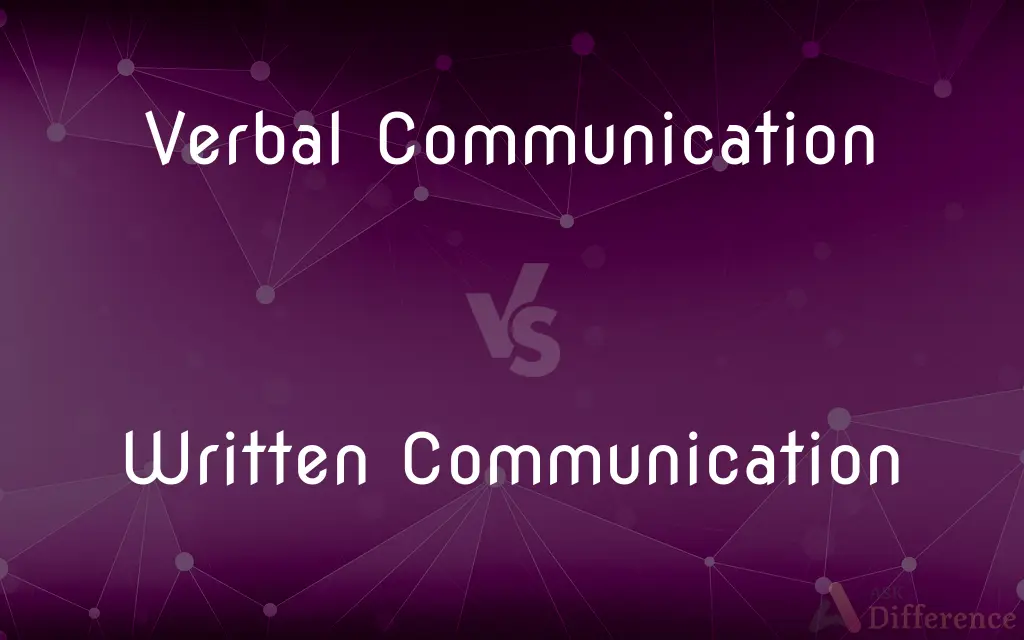Verbal Communication vs. Written Communication — What's the Difference?
By Tayyaba Rehman — Published on January 29, 2024
Verbal Communication involves spoken words and nuances of voice, ideal for immediate interaction. Written Communication uses text, providing a permanent record but lacks tone and immediacy.

Difference Between Verbal Communication and Written Communication
Table of Contents
ADVERTISEMENT
Key Differences
Verbal Communication refers to the use of spoken words and can include face-to-face conversations, telephone calls, and video chats. It allows for immediate feedback and adjustment of the message based on the listener's responses. Written Communication, on the other hand, involves conveying messages through written text, such as emails, letters, reports, and social media posts. It provides a permanent record of the communication but lacks the immediacy of verbal exchanges.
In Verbal Communication, tone, pitch, and volume of voice play a significant role in conveying emotions and attitudes, making the message more nuanced. Non-verbal cues such as body language and facial expressions also complement spoken words. Conversely, Written Communication relies solely on text, which can sometimes lead to misinterpretation due to the absence of vocal tones and physical expressions.
Verbal Communication is often more effective for complex or sensitive discussions where immediate clarification is necessary. It fosters a more personal connection and is typically more suitable for collaborative or persuasive discussions. Written Communication is preferred for formal, official, and detailed messages that require careful composition and can be referenced later.
The skills required for effective Verbal Communication include active listening, clarity in speech, and the ability to read non-verbal cues. For Written Communication, strong writing skills, the ability to organize thoughts coherently, and attention to grammar and style are essential.
Finally, the choice between verbal and written communication often depends on the context, audience, and purpose of the message. Verbal communication is ideal for immediate, personal interaction, while written communication is better suited for detailed, official, and permanent records of communication.
ADVERTISEMENT
Comparison Chart
Medium
Spoken words, voice nuances
Text, including emails, letters, reports
Feedback
Immediate interaction and feedback
Delayed feedback, no immediate interaction
Expression of Emotions
Tone, pitch, body language convey emotions
Lacks tone and physical expressions
Suitability
Effective for complex, personal discussions
Preferred for formal, detailed messages
Skills Required
Active listening, clarity, reading cues
Writing skills, grammar, organization
Compare with Definitions
Verbal Communication
Ideal for personal, collaborative discussions.
Verbal communication helped in negotiating the contract terms.
Written Communication
Conveying messages through written text.
The report was a fine example of clear written communication.
Verbal Communication
Allows for immediate feedback.
The team solved the issue quickly through verbal communication.
Written Communication
Provides a permanent record of messages.
Email is a widely used form of written communication in businesses.
Verbal Communication
Requires active listening and clarity.
Good verbal communication is as much about listening as it is about speaking.
Written Communication
Lacks immediate feedback and tone.
Misunderstandings can occur in written communication due to lack of tone.
Verbal Communication
Involves tone, pitch, and body language.
Her enthusiastic tone enhanced her verbal communication.
Written Communication
Essential for formal and detailed messages.
The legal agreement required precise written communication.
Verbal Communication
The use of spoken words to convey a message.
His presentation demonstrated effective verbal communication skills.
Written Communication
Involves strong writing and organizational skills.
Effective written communication is key in drafting a compelling proposal.
Common Curiosities
What is Written Communication?
It involves conveying messages in a written format.
Is Verbal Communication more personal?
Yes, it's often more personal due to voice nuances and body language.
What is Verbal Communication?
It's the exchange of information using spoken words.
Which is faster, verbal or written communication?
Verbal communication is generally faster due to immediate feedback.
Are writing skills crucial for Written Communication?
Yes, good writing skills are essential for clarity and effectiveness.
How important is listening in Verbal Communication?
Very important; active listening is a key part of effective verbal communication.
How do you choose between verbal and written communication?
It depends on the context, urgency, and formality of the situation.
Can written communication be misinterpreted?
Yes, especially since it lacks tone and non-verbal cues.
What's essential for effective Written Communication?
Clear organization of thoughts, proper grammar, and concise writing.
Is Written Communication good for complex discussions?
It can be challenging for complex matters that need immediate back-and-forth.
Which is more suitable for official records?
Written communication, as it provides a permanent record.
What role does body language play in communication?
In verbal communication, body language helps convey emotions and attitudes.
What's the main advantage of Verbal Communication?
It allows for immediate clarification and adjustment of the message.
Can non-verbal cues be part of Written Communication?
Not directly, but tone can be implied through word choice and structur
Can Verbal Communication be used for formal purposes?
Yes, though written communication is often preferred for formality.
Share Your Discovery

Previous Comparison
BC vs. BCE
Next Comparison
Cornish Hen vs. ChickenAuthor Spotlight
Written by
Tayyaba RehmanTayyaba Rehman is a distinguished writer, currently serving as a primary contributor to askdifference.com. As a researcher in semantics and etymology, Tayyaba's passion for the complexity of languages and their distinctions has found a perfect home on the platform. Tayyaba delves into the intricacies of language, distinguishing between commonly confused words and phrases, thereby providing clarity for readers worldwide.
















































